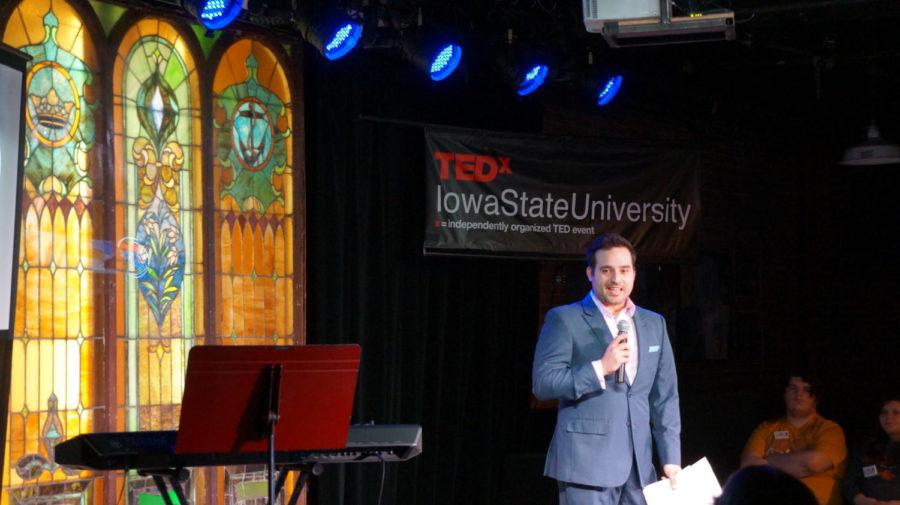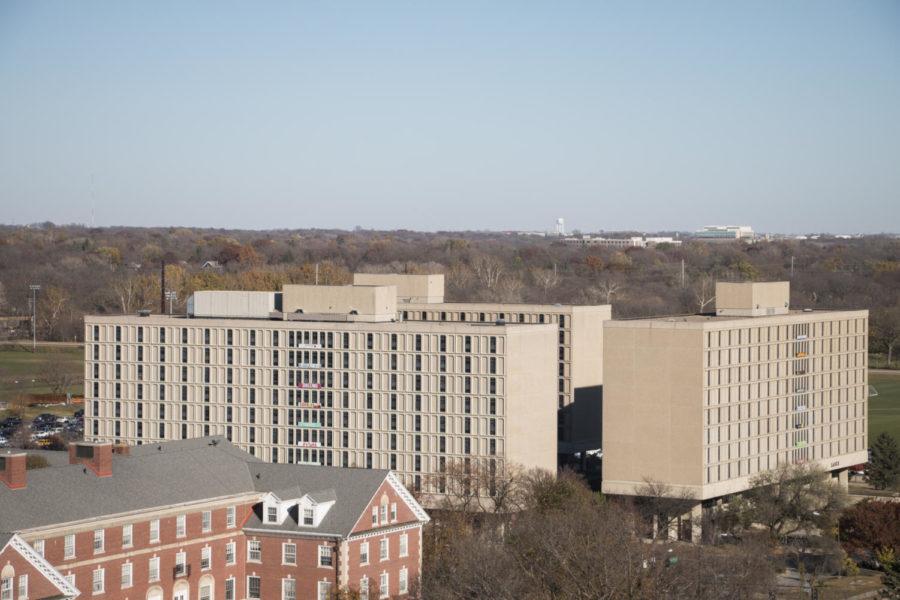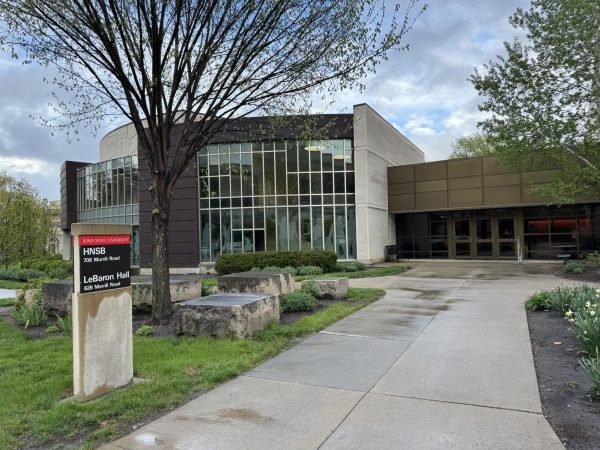TEDx provided outlet to share passions, ideas
Lawrence Cunningham, general manager of the Iowa State Daily, emceed the first TEDx event on Monday, March 30.
March 31, 2016
Seven individuals spoke about their passions and ideas for personal or community betterment at the first official TEDx talk at Iowa State on Wednesday night.
Smaller and more local, the “x” signifies an independently organized TED event. TED stands for technology, entertainment, and design, with the goal of spreading worthy ideas.
The event began with Elizabeth Stegemoller, assistant professor in kinesiology, explaining her research in music therapy. She primarily works with Parkinson’s disease patients in acquiring and maintaining bodily mobility.
Her theory for increasing mobility in patients lies in neuroplasticity, or the ability to form new connections between neurons in the brain. By using music, Stegemoller said neurotransmitter counts increase and provides a clear signal of instruction–a synchronous, rhythm based instruction–all while engaging multiple parts of the brain besides motor control.
Alex Rinehart, senior in computer engineering, was next and persuaded the audience that “storytelling helps others understand who we are.” He then went on to distinguish between narrators of stories and storytellers themselves, noting that narrators state facts while storytellers are unreliable narrators and have the ability to add background information to facts.
“We have the opportunity to be more than characters in a story. We can be storytellers,” Rinehart said at the end of his talk.
During a short intermission, Gesila Macek, junior in English, said she appreciated the viewpoint on storytelling.
“I really liked the storyteller because I’m an English major, and he made a good distinction between a narrator and a storyteller,” Macek said.
Corry Caromawati, graduate student in English, then unveiled her “new media teaching plans,” meant to be utilized in teaching languages that could lead to world peace.
After the audience watched a short TED talk video, Brad Pickhinke, senior in agricultural biochemistry, was on stage talking about “the science of change,” and living a life with purpose and a life that served others.
Rather than go by the traditional service formula of money plus time equals service, Brad wrote his own formula: reflect, serve, acquire purpose.
He broke his idea down further by asking the audience to, at some point in their day, reflect on every good thing that happened to them. Then, he asked them to plan one good thing you can do for someone the next day. Finally, he said they had to work to achieve that goal.
“You have a psychological need to serve people,” Pickhinke advised the audience.
Dakota Olson, a man who lives with cochlear implants after having meningitis as a toddler, detailed his perspective of Iowa State’s disability policy in his talk “Inclusive Design.” Frustrated with Iowa State’s Disability Service’s limited powers, Olson encouraged the audience to “evaluate environments you’re a part of.”
Olson asked the audience to imagine themselves in a wheelchair, without sight, or without hearing to see if the environment they were in lacked design elements that would make functioning and movement easier. She showed a picture of a crowded dining hall, asking audience members to imagine being in a wheelchair and trying to meet a friend in the center of this room.
“Demand accountability from those who design environments” Olson said.
Nearing the end of the event, Jake Dean, sophomore in agriculture, presented “Success: The Chapter that Isn’t in Your Textbook.” For Dean, success is not external, but instead found within individuals.
Dean said motivation to achieve goals was the largest problem he encountered in his peers, so he developed a three-step plan to combat the issue: curiosity, commitment, and confidence.
“The most important part is commitment because it involves the question, ‘Will I fail?,’” Dean said.
Instead, Dean says we need to acknowledge that question but ultimately entertain the question of “What if I succeed?”
“You have to get out of your comfort zone to take that leap of faith,” Dean said.
Finally, Cole Wesselman, freshman in biology, rounded out the evening with his emotional talk about community healing.
After witnessing a school shooting at his high school, Arapahoe High School in Centennial, Colo., in December 2014, Wesselman said he was shocked to the core and unable to decide what to do next in life. But through the efforts of not only his school and hometown community, he realized that “healing is a group effort, a community effort.”
Wesselman asked the audience to choose to live for love and kindness.
Lawrence Cunningham, general manager of the Iowa State Daily, hosted the TEDx event, spoke to the audience on the importance of sharing ideas, which is also the purpose of the TEDx events.
“The responsibility of those present [is] to take whatever peaked their curiosity, caused them to question, or made them want to support an effort and share it with others,” Cunningham said. “Don’t let the last time you think about these topics be in this room.”

















